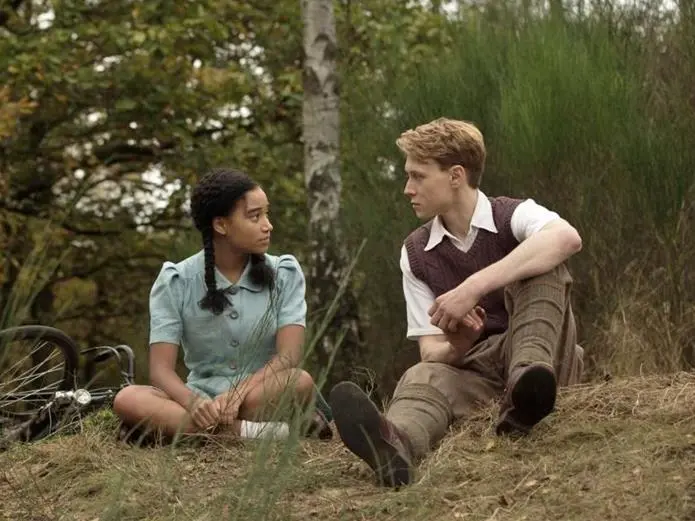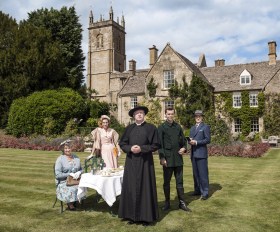Amandla Stenberg and George MacKay in Where Hands Touch.
By finding a unique angle on a well-documented topic, Where Hands Touch achieves something that many Second World War films don’t. The feature’s point of focus: children born to German mothers in the aftermath of World War I, as fathered by French Army soldiers of African descent. Such offspring were first dubbed ‘Rhineland bastards’ and then ‘Hitler’s problem’. The country’s mixed-race progeny, they belonged to women who were crucial to the Nazis’ vision of the future, but boasted a skin colour that couldn’t have been more controversial under the cruel regime. Every tale from the time seethes with heartbreak and horror, and this one toes the line in that regard; however the plight of Germany’s multi-racial inhabitants during its darkest days is rarely seen on screen.
With Belle and A United Kingdom to her name, the subject seems a perfect fit for British-Ghanaian filmmaker Amma Asante, continuing the writer/director’s examination of racial clashes – in the life of biracial woman Dido Elizabeth Belle during the 18th century, and in the marriage of Brit Ruth Williams to Bechuanaland heir Seretse Khama from the 1940s onwards. But Where Hands Touch doesn’t tell a specific true tale like its predecessors. Instead, it is merely ‘inspired historical events’ (as per the film’s own on-screen description), and the difference shows. While the feature brings its slice of history to broader attention, introducing moviegoers to the struggles faced by black Germans, that’s where its successes largely end.
For Leyna (Amandla Stenberg, The Hate U Give), life is difficult in the town of Rüdesheim circa 1944, but it’s worse when she moves to Berlin. Tired of fending off SS Officers looking for the 16-year-old, her mother Kerstin (Abbie Cornish, TV’s Tom Clancy’s Jack Ryan) believes that she won’t stand out as much in the capital; however she’s soon proven incorrect. Pre-teen son Koen (Tom Sweet, The Nutcracker and the Four Realms) is made to join the Hitler Youth. When she’s forced out of school due to her appearance, Leyna is sent to work with Kerstin. Every knock at the door still inspires anxiety, Lenya could still be taken away at any moment and shootings are happening in the streets – but she also has Lutz (George MacKay, Ophelia) the fiercely nationalistic son on a top Nazi (Christopher Eccleston, Dead in a Week: Or Your Money Back) who both wants to serve the Fatherland in battle and, after riding into her on a bicycle, can’t hide his feelings.
As scripted by Asante, an already fraught situation becomes even thornier still when Leyna and Lutz start sneaking off together. Lutz has heard his father listening to Billie Holiday records and thinks nothing of pushing Leyna in a lake when she shares that she was banned from swimming – two trivial tidbits that the film uses to explain its opposites-attract pairing. Amidst handsomely lensed frames, that’s Where Hands Touch’s approach. Presenting its characters as the sum of conflicting parts, the feature mistakes superficial details for depth. Viewers journey through a variety of juxtapositions, learning that a wannabe Nazi soldier can flout the rules and fall in love with his supposed enemy, and that a persecuted outsider can not only still pledge allegiance to the society that abhors her, but also share its disdain for other minorities. Both can also occur even in the most vicious place for one of Germany’s unwanted: a labour camp adjacent to a concentration camp. Alas, contrasting a plethora of dissimilar traits, behaviours and motivations isn’t the same as probing them, which is what leaves the movie feeling so empty.
Rather than delve into its oppressed protagonist and her Nazi paramour in any significant way, Where Hands Touch uses their undying affection as proof: that people are multi-faceted, that competing urges can exist within the same person, that love can still linger in the bleakest of circumstances and that clichés can infect every space. The film’s endgame is never in doubt – not the specifics of the narrative, but its preference for sweeping through Leyna and Lutz’s sentimental star-crossed story instead of examining the characters, their context and many clashes that spring in and around both. Though performed admirably by rising stars Stenberg and MacKay, the result is a romance that uses its distinctive angle as a backdrop as best, and as tear-jerking emotional fodder at worst. Contrived, awkward, heartstring-pulling war tales are hardly new, which ranks among Where Hands Touch’s issues in an unexpected fashion: of all the ways that the movie could’ve explored the treatment of Afro-Germans, it chose the simplest, dullest and most thematically problematic.
2 stars ★★
Where Hands Touch
Director: Amma Asante
UK, 2018, 122 mins
Release date: March 28
Distributor: Rialto
Rated: M
Actors:
Director:
Format:
Country:
Release:





